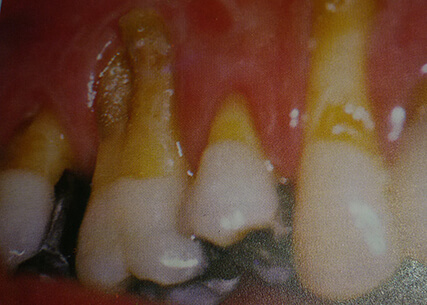Periodontal Disease

The teeth depend on bone and gums to stay in position. So if there is an imbalance of the supporting structure the teeth will eventually fall off. As a matter of fact, most periodontal diseases are preventable with proper oral hygiene, and since pain is not a regular symptom, most people neglect and postpone their dental visits for too long.
Never neglect gum diseases: Speaking of adults, tooth loss is mostly caused by poor periodontal (gum) health. This periodontal disease is caused due to prolonged tartar (hard buildup) and plaque (soft buildup) buildup on teeth that leads to irritation and bleeding gums that further lead to bone loss, irritation, and loss of teeth.
Solution: Routine Oral Examinations (every 6 months or lesser), dental prophylaxis, and scaling as needed are known to prevent Periodontal disease
Periodontal disease, also called periodontitis, is the most harmful gum disease. It is also the main reason for tooth loss in adults.
A persistent inflammatory disease, periodontitis hurts the bone (periodontium) that supports the teeth and gum tissue. If not treated at the right time, the bone can wear away. Furthermore, once periodontitis affects you, it is incurable.
Symptoms of periodontal disease
If you have periodontal disease, you will most likely notice your gums turning red or darker pink. Your gums will also swell and become tender.
Meanwhile, the size of your teeth may appear longer than usual owing to receding gums. You will also feel your teeth feeling looser. At certain times, pus may form, and teeth will feel new gaps developing between them.
Bad breath accompanies it and causes enormous pain when you brush or chew.
What causes periodontitis?
If gingivitis, a milder form of gum disease, affects your teeth, it must be treated immediately. Improper oral health habits lead to gum disease.
You can prevent it by brushing and flossing regularly to eliminate plaque from your teeth. When oral hygiene is improper, plaque grows on the teeth, leading tartar to harden around the gum line.
Bacteria in the tartar and plaque cause agitation in the gums, making way for inflammation. The inflammation of the gums causes them to move away from teeth, which causes spaces.
How to prevent it?
If not treated, the plaque gets stuck in these spaces, leading to a harmful bacterial infection that may deteriorate over time. Owing to this, the bone and the tissue supporting the teeth get destroyed, leading them to drop out or get permanently damaged.
You can prevent periodontitis by regularly brushing and flossing and by paying a visit to your nearest dental professional once every six months.


